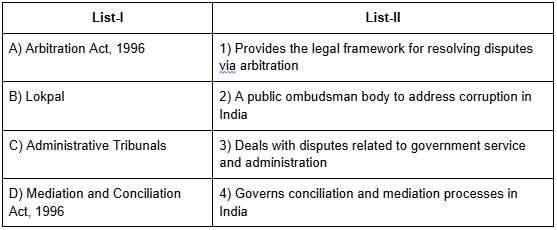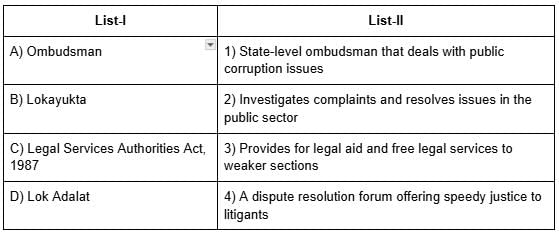Legal Studies: CUET Mock Test - 10 - Humanities/Arts MCQ
30 Questions MCQ Test - Legal Studies: CUET Mock Test - 10
Which of the following is/are the requirement(s) for an acceptance?
Ordinarily, passive concealment or mere silence is no fraud, but it may become deceptive in certain cases. In which of the following cases does it amount to fraud?
Which of the following best depicts Nudum Pactum?
Directions: The question consists of two statements, one labelled as Principle and the other as Facts. You are to examine the Principle and apply it to the given Facts carefully, and select the best option.
Principle: A contract entered into by the use of misrepresentation is voidable at the option of the other party.
Facts: Robert, with an intention to deceive Daniel falsely, stated that his car gives a mileage of 20 km/hr. In reality, the car gives only a mileage of 10 km/hr. Daniel gets induced and agrees to buy the car.
Q. Is it a valid contract?
Identify the correct statements:
(A) Arbitration agreements can be oral or written, as long as the parties agree to arbitrate.
(B) The arbitral award has no legal effect and is not binding on the parties involved.
(C) The Arbitration and Conciliation Act, 1996 governs arbitration processes in India.
(D) The parties involved in arbitration have no control over the choice of arbitrator.
Directions: The question consists of two statements, one labelled as Principle and the other as Facts. You are to examine the Principle and apply it to the given Facts carefully, and select the best option.
Principle: Any contract made for an unlawful consideration is void in law.
Facts: Tarun contracts with Sohan to kidnap a child from their locality for ransom money of Rs. 1 crores. Tarun agrees to pay the entire amount to Sohan in return of the kidnapping of child.
Q. Is it a valid contract?
______ means substitution of old contract by a new one.
Directions: Read the following information carefully and choose the best conclusion from the options.
Article 21 lays down that no person shall be deprived of his life or personal liberty except according to the procedure established by law. The procedure required by Article 21 is to be fulfilled before a person is deprived of his life and personal liberty.
It was held by the Supreme Court of India that Preamble was not a part of the Constitution in the case of ___________ and this has been overruled in the case of _________
Directions: The following question consists of two statements, one labelled as Assertion (A) and the other as Reason (R). You are to examine these two statements carefully and select the correct option accordingly.
Assertion (A): India is a secular country, and there is no official religion in India.
Reason (R): Secularism means separation of religion from politics.
The Constitution (Eighty-ninth Amendment) Act, 2003 added Article 338A that provides for the creation of _________ for Scheduled Tribes.
The implication of secularism in the Indian Constitution is
The significant distinction between Fundamental Rights and Directive Principles is that
At which stage of a crime does criminal liability arise?
Which of the following is a key stage before a crime is fully committed?
What happens at the 'attempt' stage of a crime?
Which of the following best describes the 'commission' stage in a crime?
Which of the following statements is true regarding criminal liability?
Which of the following fundamental rights was considered to be the heart and soul of the Constitution of India?
Droit administratif is known as the administrative law of
Administrative law is the law relating to the powers and procedures of
Identify the correct statements:
(A) The CrPC provides the procedure for investigation and trial of criminal offenses.
(B) The CrPC deals with the substantive law related to crimes.
(C) Cognizable offenses allow police officers to arrest without a warrant.
(D) Non-cognizable offenses require police to obtain a warrant before arresting.
'Rule of law' means
(i) supremacy of judiciary
(ii) supremacy of law
(iii) equality before law
(iv) supremacy of parliament
Match the Indian constitutional provisions with their rights:
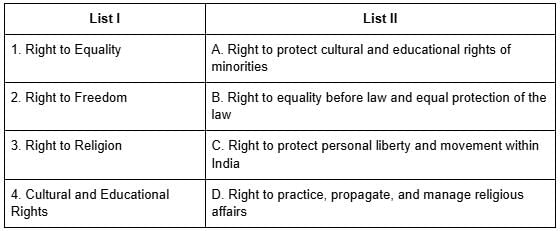
Match the requirements for the Advocates Act, 1961 with their descriptions:
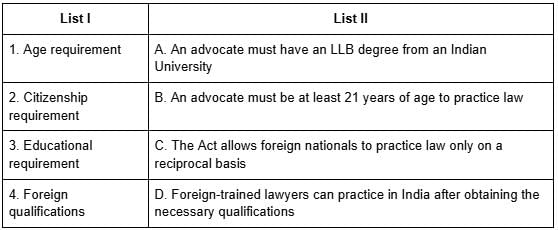
Match the Legal Services Funding Sources with their Types:
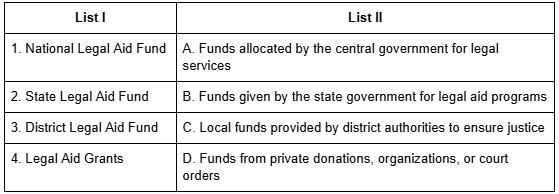
Who criticised the Droit system as being a system where no justice was possible?
Which of the following statements is/are true?



